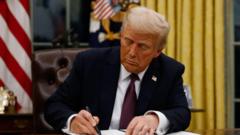In a controversial move, President Donald Trump has ordered the construction of a migrant detention center at Guantanamo Bay, with the capacity to hold up to 30,000 people. The facility aims to house what Trump described as "the worst criminal illegal aliens threatening the American people" and is expected to be separate from the existing high-security military prison.
Trump Announces Plans for Migrant Detention Facility at Guantanamo Bay

Trump Announces Plans for Migrant Detention Facility at Guantanamo Bay
The new facility is expected to increase the U.S. capacity to detain undocumented migrants significantly.
During a signing ceremony for the Laken Riley Act, which mandates that undocumented immigrants arrested for serious crimes be held in custody until trial, Trump revealed plans for the Guantanamo facility. He remarked that some migrants are considered too dangerous to be returned to their home countries, asserting that Guantanamo would serve as a secure alternative.
The new center will likely double the current U.S. capacity for detaining undocumented immigrants, as the administration proposes expanding the current Guantanamo Migrant Operations Center (GMOC). This existing facility has faced scrutiny from human rights groups, including allegations of indefinite and inhumane detention practices. The accused have included those intercepted at sea, with reports from groups like the International Refugee Assistance Project indicating longstanding issues with treatment there.
The Cuban government swiftly condemned Trump's announcement, branding it an "act of brutality." Cuban President Miguel Díaz-Canel denounced the U.S. plans as a violation of international law, asserting that Guantanamo Bay is illegally occupied territory. The Cuban Foreign Minister further criticized the proposal, claiming it exhibited a significant disregard for human dignity.
As preparations move forward, many are raising concerns about the implications of such a facility, both for the already vulnerable migrant populations and the broader international community. The Trump administration is expected to seek congressional support for the necessary funding as part of upcoming budget negotiations. Meanwhile, the Biden Administration has previously insisted that migrants at the GMOC are not detained, aiming to distinguish between the settings and treatment at Guantanamo compared to Trump's proposed expansions.
The new center will likely double the current U.S. capacity for detaining undocumented immigrants, as the administration proposes expanding the current Guantanamo Migrant Operations Center (GMOC). This existing facility has faced scrutiny from human rights groups, including allegations of indefinite and inhumane detention practices. The accused have included those intercepted at sea, with reports from groups like the International Refugee Assistance Project indicating longstanding issues with treatment there.
The Cuban government swiftly condemned Trump's announcement, branding it an "act of brutality." Cuban President Miguel Díaz-Canel denounced the U.S. plans as a violation of international law, asserting that Guantanamo Bay is illegally occupied territory. The Cuban Foreign Minister further criticized the proposal, claiming it exhibited a significant disregard for human dignity.
As preparations move forward, many are raising concerns about the implications of such a facility, both for the already vulnerable migrant populations and the broader international community. The Trump administration is expected to seek congressional support for the necessary funding as part of upcoming budget negotiations. Meanwhile, the Biden Administration has previously insisted that migrants at the GMOC are not detained, aiming to distinguish between the settings and treatment at Guantanamo compared to Trump's proposed expansions.























